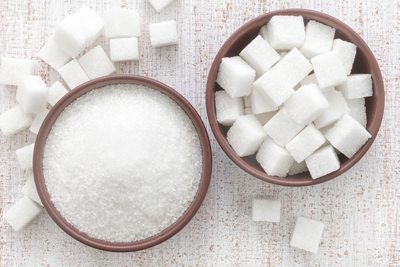“Your pantry is your first line of defense against things like high blood pressure and cholesterol,” advises top restauranteur Joe Bastianich, who became a familiar face alongside Gordon Ramsey on the cooking competition show “Master Chef.”
That pantry can also be your enemy, especially if the shelves are filled with sweet treats. Sugar bombs like cookies, donuts, candies and snack cakes can contribute to a wide range of health issues including obesity, type 2 diabetes and high cholesterol.
Cholesterol? It turns out that while the experts were looking at fat as the culprit, glucose from both sugar and carbs were sneaking in and wreaking havoc on our cholesterol readings.
Fat…more specifically, saturated fat, is only part of the problem.
Cholesterol-dense foods may not be the enemy
Most Americans have been taught that eating eggs, which are high in cholesterol, too many times each week can elevate cholesterol levels, but in truth, eggs and other cholesterol-dense foods don’t impact LDL levels as much as we think.
“Consumption of cholesterol generally does not increase your cholesterol very much. That’s why the American Heart Association has very significantly changed its recommendation on how often you can eat eggs,” according to Dr. Seth Baum, founder of Preventative Cardiology in Boca Raton, Florida. (Ref. 1)
Saturated fat – long believed to lead to significantly higher cholesterol problems – also has less of an impact on cholesterol levels than previously thought, as long as you’re not eating a double bacon cheeseburger every meal of the day.
“Saturated fats tend to increase your cholesterol much more than dietary cholesterol, but unless you’re consuming large quantities of saturated fat, it’s not as bad as we once thought,” Baum added in an interview that appeared on his medical center website.
So what’s the real culprit?
There’s really no sugar-coating it: The sweet stuff is the most responsible when it comes to unhealthy cholesterol levels.
When sugar’s not so sweet
When we eat more sugar or carbs than we can use for fuel, the excess glucose hangs around in the blood, forcing our bodies to make a decision to either convert the glucose to body fat, convert it into lipids that hang around in the blood as cholesterol or store the glucose in the liver. Since the liver can only hold so much excess glucose at any time, excess body fat and excess cholesterol are the more likely outcomes. (Ref. 2)
According to the 2010 study that appeared in the Journal of the American Medical Association, those who ate a diet with the most added sugar had the lowest HDL, which is considered the “good cholesterol,” and the highest LDL, or “bad” cholesterol. Low HDL numbers elevate the risk of heart disease, experts say.
(Ref. 3)
Those who ate the least sugar had better HDL numbers, lower LDL numbers and lower triglyceride levels.
Triglycerides are fats that are formed when we eat more food than our body can use and are stored in fat cells until we need them for energy. Sugary foods are almost instantly converted to blood glucose, providing immediate energy, so a sugar binge will certainly lead to elevated levels of triglycerides circulating in the blood unused, where they can team up with cholesterol. (Ref. 4)
When LDL cholesterol meets triglycerides, the results can be deadly. The two will build up along your arteries’ inner walls, making them narrow and potentially clogging them, reducing blood flow so it has a harder time getting to your heart, your brain and your extremities.
Not only that, if that buildup along the artery wall breaks free, it can lead to a blood clot, potentially causing a heart attack or a stroke.
Tracking the hidden sugar

Even as we learn more about the dangers of sugar – it accelerates aging, it leads to weight gain, it causes blood sugar spikes that can trigger insulin resistance - our sugar intake has increased considerably over the past 30 years.
Most Americans eat approximately three times the amount of sugar recommended by the American Heart Association (Ref. 4), and one in four Americans (Ref. 5) is taking a statin drug to control cholesterol levels, unaware that putting down the Krispy Kreme donuts could have the very same effect as the drug, but without side effects.
According to a 2010 study, Americans eat about 21 teaspoons of added sugar per day, while the AHA recommends about 6 teaspoons per day for women (a regular cup of yogurt and black coffee with two cubes of sugar) and 9 teaspoons per day for men (half of an energy drink).
The thing about sugar is that it hides everywhere – in processed foods such as crackers and bread, in most store-bought sauces including barbecue sauce and pasta sauce, in that granola bar you grabbed thinking you’d packed a healthy snack, and in dried fruit, which on the surface seems healthy but is often jam-packed with added sugars.
Learning to live without the sweet stuff – or to significantly limit your intake – is one smart way to help lower your cholesterol levels. You may even lose weight and drop your risk of developing type 2 diabetes at the same time.
References
- http://preventivecardiologyinc.com/cholesterol-myth/
- https://doctordoni.com/2014/03/how-sugar-not-fat-raises-your-cholesterol.html
- http://www.healthline.com/health/high-cholesterol/sugar-and-cholesterol
- http://www.heart.org/idc/groups/heart-public/@wcm/@hcm/documents/downloadable/ucm_300308.pdf
- http://www.health.harvard.edu/blog/statin-use-is-up-cholesterol-levels-are-down-are-americans-hearts-benefiting-201104151518
- http://www.webmd.com/heart-disease/news/20100420/high-sugar-diet-linked-lower-good-cholesterol
- http://www.prevention.com/food/healthy-eating-tips/10-hidden-sugar-bombs/chinese-takeout
|

 Youre Not Getting Enough Vitamin B6
Youre Not Getting Enough Vitamin B6  Fish Oil Relieves Joint and Back Pain, Reducing Need for NSAIDs
Fish Oil Relieves Joint and Back Pain, Reducing Need for NSAIDs  Being Fit does not always mean Healthy
Being Fit does not always mean Healthy 
 Youre Not Getting Enough Vitamin B6
Youre Not Getting Enough Vitamin B6  Fish Oil Relieves Joint and Back Pain, Reducing Need for NSAIDs
Fish Oil Relieves Joint and Back Pain, Reducing Need for NSAIDs  Being Fit does not always mean Healthy
Being Fit does not always mean Healthy